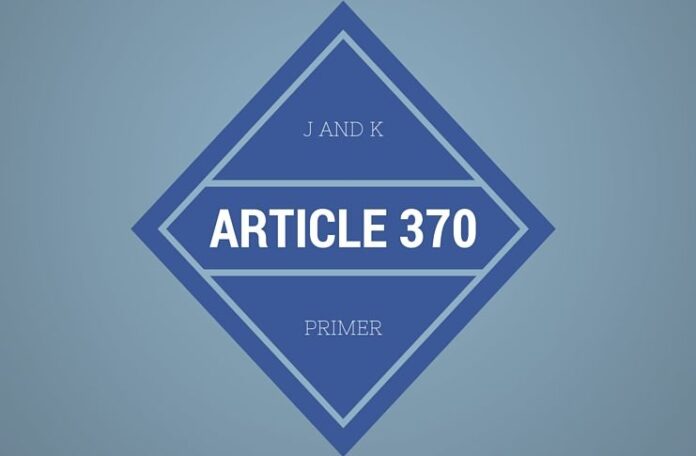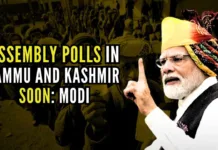
[dropcap color=”#008040″ boxed=”yes” boxed_radius=”8px” class=”” id=””]A[/dropcap]rticle 370 of The Constitution of India grants special status with respect to the applicability of Indian Constitution and the Central Acts promulgated by the Parliament of India to the state of Jammu & Kashmir. Effectively, by virtue of Article 370 and various Presidential Orders issued thereunder, it creates a Separate Constitution of India as applicable to the State of J&K. The Central Acts, including amendments to the constitution of India, can be made applicable to the State of J&K only with the concurrence of the State Government effectively giving it a veto power. This is why we have the designation of Sadr-i-Riyasat for Chief Minister and a six year term of J&K Assembly. This is also why a large number of Central Acts don’t extend to J&K.
This was opposed by Dr. Shyama Prasad Mukherjee, then Union Cabinet Minister and later founder president and the ideological edifice of the BJP’s predecessor, the Bharatiya Jan Sangh in the proverbial slogan “Ek desh mein do Vidhan, do Pradhan aur Do Nishan nahi chalenge”, that is to say, One Country cannot have Two Constitutions, Two Prime Ministers and Two National Emblems.
The article 370 is drafted in Part XXI of the Constitution, which relates to “Temporary, Transitional and Special Provisions”. Clause 3 of the Article 370 empowers the President of India on the recommendation of J&K Constituent Assembly to issue a notification for the abrogation of Article 370. However, the J&K’s constituent assembly dissolved itself on 25 January 1957 without recommending abrogation of the Article 370, leaving some people to argue that Article 370 has become a permanent feature of the Constitution of India despite being titled a temporary provision in the Constitution.
[dropcap color=”#008040″ boxed=”yes” boxed_radius=”8px” class=”” id=””]H[/dropcap]owever, the ruling BJP has pledged in its 2014 General Election manifesto for the full integration of the State of Jammu & Kashmir with Union of India by abrogation of Article 370. Further, Dr. Subramanian Swamy, Rajya Sabha member and BJP leader has also argued that Article 370 can be abrogated by a Presidential notification.
In addition to the above there is the Indira Gandhi – Sheikh Abdullah accord of 1974 (which ironically is not signed by either of them but by their emissaries), clause one whereof reiterates the continuing applicability of Article 370 in relation to the Government of the State of J&K.
It is also pertinent to note that there is no corresponding provision in the Constitution of Islamic Republic of Pakistan or of Constitution of Azad Jammu & Kashmir (read POK) similar to Article 370 of the Indian Constitution.
I believe that the Narendra Modi led NDA Government must come up with a White Paper on all aspects of Article 370 including the legal and constitutional position with regard to Northern Area (Gilgit and Baltistan) and Pakistan Occupied Kashmir (Azad Kashmir as per Pakistan) in Pakistan. This will give Indian citizens including in J&K an opportunity for an informed debate and decision on the matter.
The white paper will be an authoritative report that will inform citizens and those concerned concisely about the complex issue of Article 370 and present the Government of India’s views on the matter. It will help readers understand the issue, engage in an informed debate and frame an opinion.
- Social Security Payments : Tax or Savings - September 28, 2017
- India Uninc set for a giant leap post Demonetization & GST : A Contrarian opinion - September 3, 2017
- India Myanmar Strategic Economic Cooperation - September 1, 2017










